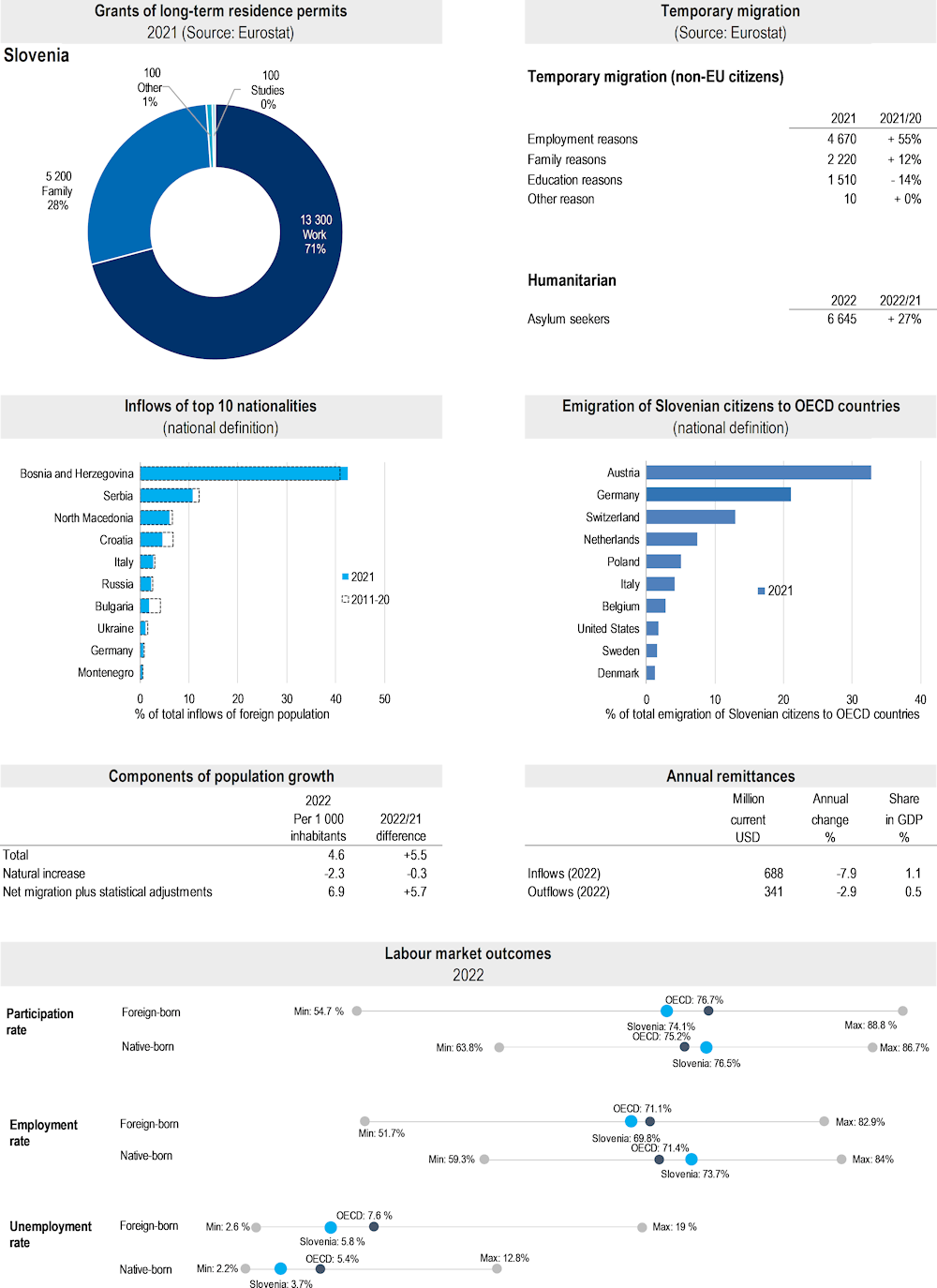In 2021, 19 000 new immigrants obtained a residence permit longer than 12 months in Slovenia (excluding EU citizens), 52.9% more than in 2020. This figure comprises 70.9% labour migrants, 28% family members (including accompanying family), 0.4% who came for education reasons and 0.7% other migrants. In addition, Slovenia received 2 700 immigrants benefitting from free mobility. Around 1 200 short-term permits were issued to international students and 4 700 to temporary and seasonal labour migrants (excluding intra-EU migration). In addition, 13 000 intra-EU postings were recorded in 2021, a 13% increase compared to 2020. These posted workers are generally on short-term contracts.
Bosnia and Herzegovina, Serbia and North Macedonia were the top three nationalities of newcomers in 2021. Among the top 15 countries of origin, Bulgaria registered the strongest increase (+28) and Bosnia and Herzegovina the largest decrease (‑3 000) in flows to Slovenia compared to the previous year.
In 2022, the number of first asylum applicants increased by 27%, to reach around 6 600. The majority of applicants came from Afghanistan (1 200), India (900) and Bangladesh (800). The largest increase since 2021 concerned nationals of India (+800) and the largest decrease nationals of Afghanistan (‑1 400). Of the 350 decisions taken in 2022, 59% were positive.
Emigration of Slovenian citizens to OECD countries decreased by ‑4% in 2021, to 4 600. Approximately 33% of this group migrated to Austria, 21% to Germany and 13% to Switzerland.
In July 2022, the Ministry of the Interior together with other stakeholders established Consultative Body on Migration, with the aim of defining a new migration strategy, reinforce dialogue with the civil society, and adapt the legislation. In addition, the Working group for the preparation of the strategy of the Government of the Republic of Slovenia in the area of migration was established on 19 October 2022.
The amendments to the Foreigners Act entered into force on 27 April 2023, focusing primarily on faster and more effective procedures for obtaining residence permit/EU registration certificate. Single permit applications for professions in the fields of healthcare, social welfare, education and training will be given priority. Furthermore, the renewed legislation provisions the adoption of an integration strategy for third-country citizens. The amendments also refer to fingerprinting, periodical verification of means of subsistence provision abolished) and extended Slovenian language and society courses. The amendment, however, does not change the language proficiency requirement at the entry level for the extension of a temporary residence permit for the purpose of family reunification and at the basic level for the obtaining a permanent residence permit – these two conditions will enter into force on 1 November 2024. In addition to that, new amendment to the Foreigners Act is in the pipeline, focusing primarily on the implementation of the revised EU Blue Card Directive and the ETIAS Regulation.
Amendments to the law on the employment of foreigners were adopted in March 2023. The aim is to address labour shortages by speeding up the recruitment of immigrant workers from abroad or through status changes while ensuring adequate working conditions and fair remuneration. Employer or job changes will now be possible without any administrative procedure, solely with the consent of the public employment service and during the validity of the single permit. This law does not apply to foreigners who will be employed in a public sector by employers who carry out healthcare and social welfare activities. Thus, the employment service will not assess the labour market, employers or the foreigner nor the legal conditions regarding the foreigner’s employment. The administrative unit will issue a single residence and work permit without the consent of the employment service for this category of foreigners. Furthermore, the asylum seekers will now be able to access the labour market three months after the application has been registered.
Concerning application of the EU Temporary Protection Directive, Slovenia implemented amendments of the Decree on the methods for ensuring rights of persons enjoying temporary protection in December 2022. The main change is the financial assistance provision for private accommodation, which will be granted either for six months or for the duration of the rental contract, in case it is shorter than six months.
In December 2022, Slovenia agreed to resettle 50 refugees from Afghanistan and Syria from Türkiye.
For further information: www.stat.si | https://www.gov.si/en/news | www.infotujci.si

